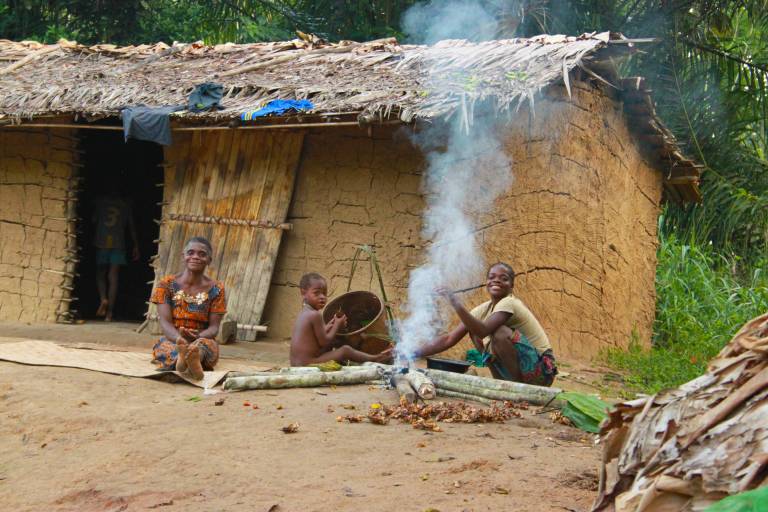Multilevel societal organisation may allow individuals access to food sharing partners and skill-based cooperative partners
22 July 2016
Like many other mammalian and primate societies, humans are said to live in multilevel social groups, with individuals situated in a series of hierarchically structured sub-groups.
 Although this multilevel social organization has been described among contemporary hunter-gatherers, questions remain as to the benefits that individuals derive from living in such groups. Here, a team of UCL Anthropologists show that food sharing among two populations of contemporary hunter-gatherers-the Palanan Agta (Philippines) and Mbendjele BaYaka (Republic of Congo)-reveals similar multilevel social structures, with individuals situated in households, within sharing clusters of 3-4 households, within the wider residential camps, which vary in size. They suggest that these groupings serve to facilitate inter-sexual provisioning, kin provisioning, and risk reduction reciprocity, three levels of cooperation argued to be fundamental in human societies. Humans have a suite of derived life history characteristics including a long childhood and short inter-birth intervals that make offspring energetically demanding and have moved to a dietary niche that often involves the exploitation of difficult to acquire foods with highly variable return rates. This means that human foragers face both day-to-day and more long-term energetic deficits that conspire to make humans energetically interdependent. They suggest that a multilevel social organisation allows individuals access to both the food sharing partners required to buffer themselves against energetic shortfalls and the cooperative partners required for skill-based tasks such as cooperative foraging.
Although this multilevel social organization has been described among contemporary hunter-gatherers, questions remain as to the benefits that individuals derive from living in such groups. Here, a team of UCL Anthropologists show that food sharing among two populations of contemporary hunter-gatherers-the Palanan Agta (Philippines) and Mbendjele BaYaka (Republic of Congo)-reveals similar multilevel social structures, with individuals situated in households, within sharing clusters of 3-4 households, within the wider residential camps, which vary in size. They suggest that these groupings serve to facilitate inter-sexual provisioning, kin provisioning, and risk reduction reciprocity, three levels of cooperation argued to be fundamental in human societies. Humans have a suite of derived life history characteristics including a long childhood and short inter-birth intervals that make offspring energetically demanding and have moved to a dietary niche that often involves the exploitation of difficult to acquire foods with highly variable return rates. This means that human foragers face both day-to-day and more long-term energetic deficits that conspire to make humans energetically interdependent. They suggest that a multilevel social organisation allows individuals access to both the food sharing partners required to buffer themselves against energetic shortfalls and the cooperative partners required for skill-based tasks such as cooperative foraging.Networks of Food Sharing Reveal the Functional Significance of Multilevel Sociality in Two Hunter-Gatherer Groups
Mark Dyble, James Thompson, Daniel Smith, Gul Deniz Salali, Nikhil Chaudhary, Abigail E. Page, Lucio Vinicuis, Ruth Mace, Andrea Bamberg Migliano
DOI: 10.1016/j.cub.2016.05.064
 Close
Close

